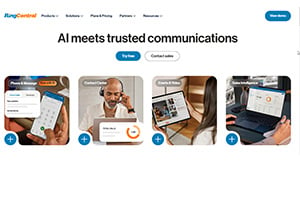AI + Human Support That Customers Trust
Unity Communications combines lightning-fast AI customer service agents with genuine human empathy to resolve customer issues faster than ever. Our integrated technology enhances every interaction, delivering smarter, seamless service while preserving the human touch your customers value.
Trusted by Hundreds of Small and Medium-Sized Businesses for Reliable BPO Solutions











Why Choose Unity Communications?
Slash wait times, boost accuracy, and solve customer issues faster with AI customer service agents that work with your team. Whether you’re scaling rapidly or filling service gaps, we deliver consistent, scalable support that evolves with your business.
Faster Response Times
Instantly route inquiries to reduce wait times and improve first-touch resolution.
First-Call Resolution Success
Resolve issues correctly the first time with AI precision and human insight
24/7 Support Coverage
Maintain 24/7 customer support with always-on AI agents backed by human oversight when required.
Assured Customer Satisfaction
Maintain high CSAT with unified responses and seamless support across every interaction and channel.
Ongoing Learning and Improvement
Improve every touchpoint as our AI learns from interactions to help your team get smarter over time.
Seamless Team Collaboration
Eliminate silos with AI-integrated systems and staff for smoother handoffs and real-time updates.
Powered By Leading Technologies

















Elevate Customer Experiences with AI-Powered Agents
Smooth Transfer to Human Agents
Hand off complex issues to live agents with full conversation history.
Company-Wide Integration
Unify tools, teams, and data to deliver consistent support across every channel.
24/7 Availability
Support customers around the clock without adding to your headcount or overhead.
Intelligent Automation
Automate routine tasks like FAQs and order tracking to boost agent efficiency.
Custom-Built Voice Agents
Create branded, human-sounding AI agents tailored to service goals and tone.
Continuous Optimization
Track performance, apply improvements, and keep AI agents sharp and effective.
Our AI Agent Implementation Process
Discover and Assess
Identify customer service processes that can be improved with Ai vs. those best handled by human agents.
Build and Deploy
Develop your AI agent tailored to your business needs and integrate it into existing workflows.
Gather Human-Ai Insights
Create a continuous feedback channel between AI and human agents to improve performance and learning.
Refine and Calibrate
Fine-tune the AI model to adapt to changing customer needs and maintain quality.
Optimize for Performance
Use combined human insights and AI analytics to improve response efficiency, reduce costs and drive engagement.
What Can Our AI Customer Service Agent Do for You?
Provide 24/7 Customer Support
Deliver instant, around-the-clock service. Our AI agent handles both common questions and complex issues any time—day or night.
Resolve Issues Automatically
From troubleshooting to processing returns, the AI guides customers through solutions without the need for human intervention.
Answer FAQs Instantly
Speed up response times by instantly addressing frequently asked questions with accurate, consistent answers.
Capture and Qualify Support Tickets
Our AI gathers essential customer details, prioritizes requests, and categorizes support tickets to help your team resolve issues faster.
Escalate to Live Agents When Needed
Seamlessly hand off conversations to human agents when a personal touch is required, all without losing context.
Support Multiple Languages
Serve a global audience with AI that understands and communicates in multiple languages to improve accessibility and satisfaction.
Connect Seamlessly with Your Systems
Connect with your helpdesk, CRM, and knowledge base to deliver consistent service across every customer touchpoint.
Send SMS Notifications
Keep customers informed with automated SMS notifications for ticket updates, resolution confirmations, and follow-ups.
Automate Call Reminders and Alerts
Boost customer engagement with proactive voice reminders about pending issues, scheduled callbacks, or important updates.
Do AI customer service agents work?
Yes, AI customer service agents work—and they’re transforming how businesses deliver support. They handle high volumes of routine tasks quickly and accurately, reduce costs, improve efficiency, and work alongside human agents to deliver faster, more personalized service. Unlike basic chatbots, AI agents adapt to customer needs in real time, integrate with business systems, and learn from every interaction, making support smarter, more scalable, and more human-like over time.

How AI Customer Service Agents Work and Why They’re Transforming Customer Experience
Artificial intelligence (AI) is ushering in a new era of customer experience (CX), revolutionizing how businesses meet growing service demands. AI customer service agents manage high-volume tasks quickly and accurately, enabling faster resolutions without overburdening support teams.
Their role rapidly expands across business process outsourcing (BPO) environments, where precision, speed, and consistency are critical. This article explores how these agents work and why they’re redefining the future of customer support.
How AI and human agents work together seamlessly
AI agents handle repetitive, time-sensitive tasks across customer service channels. This frees customer service representatives (CSRs) to focus on complex issues requiring empathy, contextual understanding, and nuanced judgment, resulting in faster, more human-centered support.
AI excels in structure and speed, while people thrive in empathy and nuance. Together, they create a balanced system that gives customers faster, more effective help and allows your team to focus where it matters.
Here’s how this division of labor plays out in daily support:
- AI agents handle frequently asked questions (FAQs), password resets, and data lookups.
- Human agents step in when emotional intelligence or complex judgment is needed.
- Workflows pass between AI and human agents for full resolution.
This approach helps customers and supports your agents. Reducing ticket volume and task repetition eases burnout and improves job satisfaction, leading to better overall service.
The hybrid model fits naturally into AI and BPO environments. It brings operational control while scaling support that feels personal.
AI agents vs. traditional chatbots: What sets them apart
Many businesses still rely on rule-based chatbots that follow limited scripts. These bots answer basic questions but fail to handle complex, unpredictable customer needs. In contrast, AI customer service agents respond and adjust automatically, using real-time data and learned behavior.
AI agents analyze customer inputs, detect intent, and respond based on patterns, not prewritten flows. This gives them flexibility during conversations and lets them handle more meaningful tasks. Chatbots can’t match this adaptive reasoning or dynamic responsiveness.
While chatbots only follow logic trees, AI agents act autonomously. They process language, track previous conversations, and make decisions based on real-world inputs without constant human intervention.
Some capabilities that set AI agents apart from basic chatbots include the following:
- Ongoing learning improves with every customer interaction.
- Smart escalation loops in human agents when empathy or judgment is needed.
- Seamless integration connects with customer relationship management (CRM) systems, billing, and knowledge bases.
- Dynamic responses adjust answers based on tone, urgency, or issue type.
This leap from static bots to adaptive agents helps your support feel more human, efficient, and dependable.
How AI customer service agents work
AI support agents operate through layered systems that process, analyze, and respond in real time. They start with natural language understanding (NLU), identifying intent and extracting meaning from messages.
Then, intelligent routing and response systems decide what happens next based on context. AI customer service agents combine several capabilities to deliver fast, relevant help. They match inquiries with past cases, pull real-time data, and adapt responses using flexible logic without relying on rigid scripts or manual oversight.
The real impact begins when these systems connect with your business tools. Integration with CRM, billing, and knowledge bases gives the AI complete visibility into each customer’s situation. That access fuels more accurate answers and smoother resolution paths.
See how everything comes together in practice:
- Intent detection kicks in as soon as a customer types.
- Relevant data is retrieved instantly to personalize replies.
- Escalation logic sends issues to humans when judgment is required.
- Feedback loops help the system improve with every interaction.
These technical layers allow your AI support to work smarter.
AI agents that integrate across departments and channels
AI agents work across departments, not just in your support team. They sync with sales, logistics, billing, and information technology (IT), giving you a unified view of customer activity. This reduces blind spots and helps agents respond with accurate, timely information.
By connecting tools and processes, AI lets teams share insights that used to stay siloed. CSRs can access both instantly if a customer issue touches shipping and invoicing. AI in call centers means more than chat. It brings orchestration across every touchpoint.
AI customer service agents use real-time data from connected systems to guide each response. This cuts errors, shortens handling time, and speeds up handoffs across channels and teams.
Here’s how it works:
- Order updates pull data from fulfillment and finance in one thread.
- Refund issues flow through billing and customer support without friction.
- Outage alerts reach IT and notify affected customers in real time.
This cross-functional support model scales easily across business units. It also fits well with outsourcing and artificial intelligence (AI) strategies prioritizing speed and accuracy.
How AI support improves speed, efficiency, and cost control
You don’t need to expand your support team to meet growing demand. AI systems reduce costs by handling common inquiries, automating repetitive tasks, and delivering 24/7 service without breaks, shifts, or added staffing needs. The impact is immediate and measurable.
By deflecting tickets from your human team, AI customer service agents reduce wait times and shrink resolution queues. They act fast on simple requests and pass complex ones to the right CSRs and BPO agents, keeping operations lean and efficient.
Speed is only part of the advantage. These tools also improve consistency and decrease manual errors. AI simplifies workflows and manages cases so your team can focus on tasks that need judgment or empathy.
Here’s where AI cuts costs and boosts output:
- Automates high-volume tasks 24/7
- Speeds up routine support flows
- Minimizes training and onboarding time
- Avoids overstaffing during off-hours or seasonal peaks
The use of AI in the BPO industry reflects these same benefits at scale, making it a smart fit for growth-minded support teams.
How to measure AI customer service performance
To understand if your AI tools are helping, track their effectiveness using key performance indicators (KPIs). Measure traditional CX metrics, including first response time, resolution rate, and customer satisfaction scores (CSAT).
Then, layer in AI-specific benchmarks for a fuller picture. Newer KPIs include metrics such as:
- Containment rate is how often AI resolves issues without human intervention.
- Sentiment shift is how AI changes a customer’s tone during interaction.
- Agent-assist usage is how frequently AI supports your team during live chats.
To maintain consistency, apply quality assurance (QA) across AI and human interactions. This will help you flag gaps and improve how AI works in your support setup. Outsourced QA services can help you track these insights objectively.
Use AI-powered KPIs and outsourced QA to identify what’s working, what’s not, and where to improve. These numbers go beyond speed. They show how well AI fits into your team’s daily work.
Real industry examples that prove AI’s impact
AI is already making support faster and smarter across industries. In healthcare, automated tools handle appointment scheduling, billing inquiries, insurance validation, and patient follow-ups. This eases admin load, cuts queues, and frees staff to focus on urgent care.
The benefits of outsourcing in the healthcare industry grow even stronger when paired with AI. External teams can manage repetitive inquiries using intelligent systems, while in-house staff focus on high-priority or sensitive patient concerns.
This hybrid model delivers better patient outcomes while reducing costs. Retail and finance teams benefit too. AI systems respond to order updates and payment status checks in real time, while human agents can focus on tasks that require empathy or escalation.
This balance improves workflow and response quality. Real-world gains include:
- Fewer missed opportunities and ticket escalations
- Lower handling time across chat, voice, and email
- Improved accuracy from integrated data systems
- Better customer satisfaction and lower support costs
Intelligent systems provide speed, scale, and consistency without straining the team, regardless of your industry.
Why smart task sharing between AI and people works
AI customer service agents can manage high-volume requests so your team doesn’t have to. These systems instantly handle order updates, password resets, and appointment changes, allowing your CSR team to resolve issues requiring empathy, context, or nuanced decision-making.
Smart task sharing reduces agent burnout and improves job satisfaction, morale, and performance. This model also improves accuracy and gives your team more time to solve complex problems carefully.
Smart delegation makes service smoother for customers and more manageable for your staff. It keeps response times short, escalations low, and job satisfaction high. With the right balance, your team stays engaged and productive.
Here’s how task sharing helps both sides:
- Fewer repetitive tickets clog the queue
- Higher quality responses from rested agents
- Faster escalations when emotion or context is needed
- More time spent on high-value interactions and retention
You’ll see even more significant gains when this model supports customer service in the BPO industry, where scale and consistency are vital across multiple client accounts.
Build trust through seamless and empathetic support
AI tools can now hold natural conversations that match tone and adapt responses to meet emotional needs. This leads many CX leaders to ask, “Can AI replace call center agents?” The answer depends on how you apply it. When used effectively, AI enhances rather than replaces human interaction.
When AI customer service agents step in with thoughtful, responsive language, they show consumers they’re being heard. They can match sentiment, maintain context, and hand off to humans when a situation calls for it. That balance builds confidence and reduces friction during escalations.
Smooth interactions drive trust. AI that uses real-time customer history avoids repeat questions and tailors replies. These moments feel personal, not automated, giving users a sense of continuity and care. Here’s how AI helps you build trust at scale:
- Adapts tone to match customer emotion
- Escalates sensitive issues without delay
- Avoids repeating questions using conversation memory
- Maintains transparency with clear status updates
When your tools feel helpful rather than robotic, customers respond with trust and loyalty. With every interaction, you build stronger service relationships.
How to roll out an AI service the right way
The best approach to adopting AI customer service agents begins with a focused pilot. Select a specific use case with a high volume of simple inquiries. This lets you test performance, gather feedback, and spot issues before scaling across the operation.
Once the pilot proves effective, AI will be expanded into similar workflows. Gradual deployment keeps your team confident while refining training data and conversation models. Assign team leads to monitor feedback and review edge cases.
A transition this large needs early collaboration. To align goals, involve support managers, frontline staff, and IT. Frequent updates keep teams aligned and ease the transition. People are more likely to adopt change when they understand its value.
Use these steps to roll out AI without disruption:
- Start with one channel or task.
- Monitor performance and refine replies.
- Train agents on working alongside AI.
- Use early wins to expand into new areas.
This rollout strategy helps you adopt AI with control and clarity. It gives your team time to adjust and your customers a better support experience from day one.
Practical tips for safe, effective AI deployment
Bringing AI customer service agents into your operation starts with transparent governance. Identify the support tasks AI will handle. Then, define data use, handoffs, and escalation rules. This keeps your rollout focused, safe, and aligned with customer expectations.
Privacy requires upfront planning. Users should be informed when speaking to AI about how data is handled and where human help is needed. Additionally, you should apply consent-first data policies and review compliance across your tech stack before going live.
Ongoing oversight matters. Assign leads to monitor AI behavior, flag breakdowns, and retrain models using real service data. This keeps AI replies grounded in reality, not just preloaded scripts or assumptions.
Apply these actions to guide safe AI deployment:
- Map roles and responsibilities early.
- Disclose AI use clearly to customers.
- Use consent-based privacy safeguards.
- Audit and retrain using live performance data.
This approach keeps your service accountable and trustworthy. It lets AI handle volume while your team protects context, privacy, and the customer’s voice.
The bottom line
AI customer service agents offer a clear path to enhanced efficiency, reduced costs, and improved customer satisfaction. By handling routine inquiries and complex data processing, they free your human agents to focus on building relationships, solving unique problems, and delivering the empathetic support that drives customer loyalty.
The companies implementing these solutions today are positioning themselves for sustainable competitive advantage tomorrow. The technology is proven, the benefits are measurable, and the time for action is now.
Are you ready to explore how AI customer service agents can transform your support operations? Let’s connect and explore how we can bring lasting value to your support operations.
Frequently Asked Questions and Answers
Let’s Connect and Explore
Looking to Meet Now? Schedule A Meeting Today



